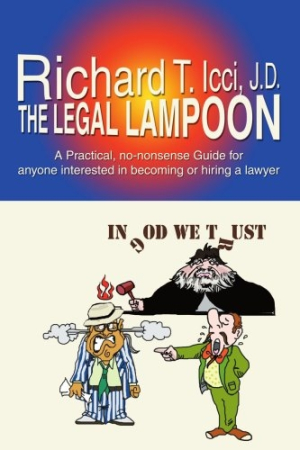The Legal Lampoon
A Practical, No-Nonsense Guide for Anyone Interested in Becoming or Hiring a Lawyer
Richard T. Icci, author of The Legal Lampoon: A Practical, No-Nonsense Guide for Anyone Interested in Becoming or Hiring a Lawyer, is a cynic about the legal profession.
Icci is also an experienced lawyer practicing in New York and Connecticut. He says he has written this book “to demonstrate something sorely lacking in the press, on the big screen and on television: that the truth about the legal profession is stranger and more comical than the fiction.” Moreover, Icci has a distinct purpose regarding potential law students, which is to “convince those of you who thought you would become instant millionaires upon graduation from law school, to save your money, as well as your sanity, and to pursue some other career.” What follows is a case-by-case, harsh critique of lawyers, the legal system, clients, and judges.
According to Icci, the most significant reason for becoming a lawyer is the belief that the law is a path to wealth. He attempts to demonstrate the fallacy of this belief, although he cites no research studies or statistics regarding the average income of attorneys in New York or any other part of the United States. This is not to say his analysis is wrong, but rather that he would be more authoritative with evidentiary support for his conclusions.
There is little in The Legal Lampoon that is positive. Law school, according to Icci, is driven by paranoia and is populated by professors who are “geeks” using the Socratic method that teaches nothing. Icci observes that there are “rather few attractive professors teaching in our law schools today.” There is no discussion of how or why physical attractiveness relates to intelligence or teaching ability.
Icci concludes that the common thread relating to all judges is politics: Judges are mostly elected by the people or appointed by a governor. In either case, politics plays a heavy role. What is lacking in this analysis, however, is any serious discussion of the extent to which politics affects the decisions judges make once they are on the bench. And, there is no recognition that the political aspects of judicial selection vary from state to state and from court to court, even within one state.
The text is replete with entertaining stories from actual cases that involve colorful clients and often unscrupulous lawyers. These vignettes are amusing and often instructive on the vagaries of the law and the participants in the legal system. They work well to support the author’s view that we need lawyers only because “(1) people do bad things to other people; and (2) people do not trust each other.”
The end of The Legal Lampoon is troubling. Icci concludes: “The fundamental problem with the practice of law—and those who practice it—is that the profession is enveloped in negativity.” Given the discourse filling the pages that precede this conclusion, the reader is left with the impression that this observation is accurate. Why, then, does Icci or any other lawyer continue to practice law? And, what are Icci’s suggestions for changing this situation, other than by avoiding lawyers, the legal system, and law school?
But this is a “lampoon,” a piece of satire meant to shed light on a problem in a humorous way. There are stories of wretched clients, incompetent and dishonest judges, and twisted, money-grubbing lawyers, but, unfortunately, there is very little real humor in Icci’s book.
Reviewed by
John Senger
Disclosure: This article is not an endorsement, but a review. The publisher of this book provided free copies of the book and paid a small fee to have their book reviewed by a professional reviewer. Foreword Reviews and Clarion Reviews make no guarantee that the publisher will receive a positive review. Foreword Magazine, Inc. is disclosing this in accordance with the Federal Trade Commission’s 16 CFR, Part 255.

